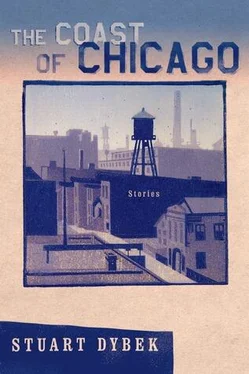I was speeding down a gravel-pinging road and caught only a glimpse of them, but took it as an omen to continue following the drunken divorcée I’d met earlier in a roadside bar and grill where I’d stopped for a coffee on my way back to Chicago. Divorcée was her word, the way she’d introduced herself. “I’m celebrating becoming an official gay divorcée,” she’d told me. I must have looked a little surprised because she quickly added, as if I’d gotten the wrong idea, “You know, not gay like with other women, but gay, like, you know, wild.” We had several drinks, danced to the jukebox, and ended up in the parking lot, necking in her pickup. When I started to unbutton her blouse, she asked, “You intend to sit out here all night like teenagers or do you want to follow me home?”
I didn’t know the countryside. I followed her down highways, one veering into another, so many turns that I thought she must be taking a shortcut. I had the windows rolled down, hoping the streaming night air would clear my head. Beyond the narrow beams of my headlights, I could feel the immensity of prairie buoying us up, stretching in the dark without the limit of a horizon, and I felt suddenly lost in its vastness in a way I’d only felt before on the ocean, rocking at night in a small boat. She kept driving faster, and I could imagine the toe of her high heel pressing down hard on the workboot-size gas pedal of her truck. I wasn’t paying attention to where she was leading me and couldn’t have kept track if I’d tried. Unlit blacktop tunneled through low hanging trees. By the time we hit the dirt roads she was driving like a maniac, bouncing over railroad crossings and the humps of drainage pipes, dust swirling behind her so that her taillights were only red pinpoints, and I wondered what radio station she must be listening to, wondered if she was drunker than I’d realized and she thought that we were racing, or if she’d had a sudden change of heart and was trying to lose me on those back roads, and I wondered if I ought to let her.
Tonight, a lot of people are still up watching the nighthawks hunt through the streetlights. The white bars on their wings flash, as they dip through the lights, then glide off against the dark trees that line the street. The trees seem more like shadows, except where the inverted cones of light catch their leaves and heighten their green. And despite all the people still awake, unable to let go of the evening, leaning from windows, smoking on steps or rocking on front porches, it’s quiet — no small talk, or gossip, no stories, or lullabies — only the whir of insects and the stabbing cries of birds, as if we all know we should be sleeping now, leaving the nighthawks to describe the night.
During Sunday mass in summer, a woman sometimes fainted. She fainted at the 11:15 mass which, during summer, was the last mass of the day. By then, banded shafts of sunlight streamed through the towering stained glass windows, and not even the cool marble and plaster of the church could keep out the heat. Despite the heat, the men in the Holy Name Society who served as ushers wore suits and ties. Their Holy Name pins glinted from their lapels as they escorted parishioners down the aisles to empty spaces in the pews. The 11:15 mass was always crowded. I thought of it as the adult mass. When I’d been a student at St. Roman’s Grade School, we were expected to attend mass at 9:00 a.m. and to sit with our classes under the vigilant eyes of nuns. There weren’t any nuns to be seen at the 11:15 mass. Women dressed for it as if they were going out for the evening. I would find a seat in the choir loft from which I could look over the rows of crowded pews for the woman who fainted.
Even in the crowded church I could find her. She always wore her hair pinned up, ballerina style, exposing her slender neck, and the same summer dress, a blue-green that I imagined she’d matched to the shade of her eyes. It was sleeveless, revealing the curve of her shoulders; the seam of the zipper down the back traced the contour of her slim waist and hips. Surrounded by women in flowered prints and polka dots, she was easy to spot. Everything about her seemed graceful: the way she made the sign of the cross, then folded her hands to pray, the willowy motion of her body as she knelt and stood and sat in response to the mass. I’d never seen her anywhere but at church. She made going to mass bearable. I would have watched her whether she fainted or not.
That summer, after my sophomore year in high school, was the last summer I went to church. I went only because I didn’t want my family to feel that, yet again, they’d failed to pass on something they believed was essential. They had sent me to Catholic grade school, where every morning began with a mass — usually a requiem mass or a mass for the feast day of a martyr. Perhaps I had already attended too many masses. I was bored and had come to resent the suffering, death, and, even more, the fear underlying religion. To be free of the fear, it seemed necessary to be free of the faith. I knelt daydreaming about the woman while the mass blurred around me. I imagined her after mass, alone in an empty room, drawing the blinds and then drawing the zipper down the length of the blue-green dress. I could remember a time not long before when I believed such thoughts, especially during mass, were a sin for which I could burn. Now, the only sin that worried me was that she might somehow sense the weight of my stare on the back of her bare neck. It would be wrong to intrude on her in any way. In the crowded church, she seemed to kneel alone at the private center of her own devotion. Watching her, I thought that if I could pray with such fervor I would still believe in those saints and angels of my childhood who gazed down from the domed ceiling of the old Polish church.
Then, sometimes, before my eyes she would begin to faint. I recognized immediately the small adjustments fainting brought on: her hand sweeping across her forehead as if brushing back hair held perfectly in place; the crescent of sweat staining her dress. By the Sanctus she wavered as she stood. I could almost feel the heat as I imagined she felt it: each candle flame flickering another unnecessary degree against her flushed cheeks, the steaminess of the perspiring bodies around her, the hot exhalations of all that chanting and singing. It amazed me that no one else paid any attention to her. All around the church, women knelt fanning with hymn books. Her hymn book dropped from her hand to the pew before her. A single fan whirred over the pulpit as if preaching a sermon. The Cupidlike cherubim and graver seraphim gazed down impassively from the firmament of the nave. Perhaps she was praying fervently, Please, Lord, don’t let me faint again . If so, it was a prayer that went unanswered.
Her head droops; she tries to prop herself up with her elbows, but slumps clutching the top of the pew with one hand as she sinks between the bench and kneeler. Finally, the woman next to her has noticed and awkwardly tries to help her to the seat, but it’s too late, she is sliding down, drifting, collapsing to the marble floor with a thump that draws heads from all over the church and brings the Holy Name ushers rushing from their stations. They gather her in their arms and hurriedly carry her — throat flushed and mottled, eyes rolling open and closed, sweaty tendrils of hair undone, lips moaning as if continuing to pray — along the center aisle of the packed church, pausing only a moment as the hand of an old woman in a babushka darts out from a pew to tug down the hem of the blue-green dress that has ridden up those slender thighs.
Saints
The saint, a virgin, was uncorrupted. She had been frozen in a block of ice many years ago.
Читать дальше












